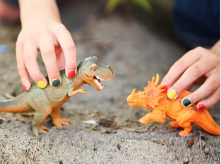
Avoiding danger is a key survival skill for any species. One way our species accomplished this was by developing systems in our brains over tens of thousands of years that would make it unavoidable for us to not notice danger, and as a result, hopefully, respond to it. This system has been identified as the negativity bias by social scientists – “even when of equal intensity, things of a more negative nature (e.g. unpleasant thoughts, emotions, or social interactions; harmful/traumatic events) have a greater effect on one’s psychological state than neutral or positive things.”
Our modern-day brains are equipped with this finely tuned built-in brain apparatus that’s super-sensitive to negativity, but instead of using it to be hyper-aware of negative things like tigers stalking us or other tribes moving in on our territory, our brains dwell on no Facebook likes, being looked over at work, the aches and pains of an aging body or insults we received years ago.
Some people seem to be able to brush off these negative feelings effortlessly and move on with life while for others, the negativity turns into habitual thought patterns. But there’s no reason that the more negatively-inclined of us can’t learn to cope and even thrive with negativity bias and in fact, I think those who consciously learn to do so can turn it into an advantage.
First, consider another psychological finding called the “facial feedback hypothesis” which demonstrates how manipulatable the brain is. The “facial feedback hypothesis” is the idea that facial movement can influence emotional experience. Your brain doesn’t just look externally for stimulus but actually pays attention internally to what your body is doing. So, when it senses that a muscle, like those connected to smiling, are flexing, the brain attributes it to happiness, and then we feel happy. In other words, our brains can be manipulated by conscious physical effort.
Our physical bodies aren’t the only thing that can change our emotions – our conscious and unconscious thoughts affect emotions too. Thoughts can trigger emotions, like worrying about catching a flight, and they also serve as an appraisal of that emotion: as in, “this isn’t a realistic fear”. The former causes emotions, the latter dispels them.
So, you wake up and the body is stiff, your mind is cloudy, the alarm clock hurts your ears – all these physical stimuli are signals that the brain intends to give meaning to. These negative feelings remind you of a thought, “I hate my job, It’s the worst.” Now the brain has the proof it was looking for to justify the emotion – “You feel sad.” You take that sad feeling and apply further cognitive distortions to it, “I always feel sad and it will never get better.” Those thoughts are heard by the brain, it pushes the buttons and pulls the levers and releases some more chemicals and now you feel worse. You take a long time to get out of bed and you choose to skip the gym and eat a pop-tart instead — these actions reinforcing negative thoughts causing more sad emotions. Repeat this enough mornings in a row and you’ll have a personal Rube Goldberg machine of entrenched thought patterns where “waking up” = “life is pointless”. This is one manifestation of depression.
What if you chose to attribute those negative feelings somewhere else? Stiff body, cloudy mind, alarm clock: Instead you think, “This feeling in the morning? This isn’t because of work. This is the prerequisite feeling before achievement is possible. This is how you know you’re on the right track. This is what winning feels like.” The brain believes you. And again starts to look for a way to justify those thoughts. You come up with the thought, “I’m making progress at work.” The brain pushes those buttons and pulls those levers and releases some more chemicals and now you feel better. So you go to the gym and stick to your diet. Repeat and eventually “waking up” = “Life is full of possibilities.”
Apply this to every scenario where negative feelings occur:
That uncomfortable feeling of confusion isn’t proof of incompetence, but evidence of being on the threshold of learning something new.
That dissatisfaction isn’t proof of discontentment, but evidence of putting in the required amount of effort before achievement is possible.
That feeling of fear due to uncertainty isn’t proof of your incapableness, but evidence that you’re getting stronger
Exercising doesn’t feel great all the time which is why many people don’t do it. You have to come to learn that the negative feelings of exhaustion, discomfort and pain are actually good – no pain, no gain. Those feelings mean you’re doing it right and the reward is forthcoming.
Epicurus said,
“Give thanks to nature, the bountiful, because it has made necessary things easy to procure, while things hard to obtain are not necessary.”
Can one feel a near-constant sense of progress by taking what nature gives so readily and translate dissatisfaction, discontent, uncertainty and disappointment into something else? What if instead of considering those negative feelings as something to be avoided, we saw them as necessary and looked forward to them like sign posts informing us that we’re on the right track? Since those negative feelings will be there one way or another, I’d say might as well try to make the most of them.





